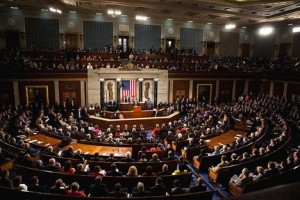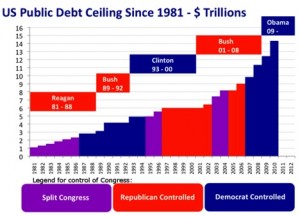A guest blog by Dave Landry, Jr.
Even though the recent government shutdown ended on October 17 when President Obama signed the Congress-passed bill, many questions linger in the aftermath of the near-crisis: Did Obamacare play a significant role in this shutdown, or was it merely a pawn of partisan politics? If the bill had not been passed by Congress and signed by President Obama, what would have happened to the debt ceiling? Would the country have defaulted, throwing the economy into disarray?
 On October 16, Congress voted to approve a budget compromise that ended a tense political standoff that had shut down federal programs for 16 days—leaving hundreds of thousands of federal workers in temporary furlough. Narrowly averting a default that would have seriously damaged a slowly recovering U.S. economy, as well as lead to downturns in economies around the world, the bill allows the United States Treasury to continue borrowing to pay the nation’s debts.
On October 16, Congress voted to approve a budget compromise that ended a tense political standoff that had shut down federal programs for 16 days—leaving hundreds of thousands of federal workers in temporary furlough. Narrowly averting a default that would have seriously damaged a slowly recovering U.S. economy, as well as lead to downturns in economies around the world, the bill allows the United States Treasury to continue borrowing to pay the nation’s debts.
While the original topic of much discussion of in the weeks leading up to the shutdown was Obamacare, driven by Tea Partiers who wanted to prevent Obamacare from enacting its website, the focus moved away from healthcare and onto the increasing the debt ceiling to avoid a possible default asthe two parties squared off.
With Democrats and Republicans at an impasse, forging a bipartisan agreement that would resolve the situation seemed unreachable. While neither party wanted to be identified as the one who ultimately didn’t pass the funding measure to raise the $16.7 trillion debt ceiling, neither party was also willing to concede their stance.
 What would have happened should the deadline pass, and no accord reached?Goldman-Sachs estimates that just one month after exceeding the debt limit, unemployment would rise, Social Security benefits may stop, and there could be up to a 4.2 percent drop in annualized GDP.
What would have happened should the deadline pass, and no accord reached?Goldman-Sachs estimates that just one month after exceeding the debt limit, unemployment would rise, Social Security benefits may stop, and there could be up to a 4.2 percent drop in annualized GDP.
Some experts believe that President Obama would have to act unilaterally, ignoring the debt limit, to avoid economic ruin. Citing the 14th Amendment and the powers that previous U.S. presidents have assumed during times of crisis, some consider this as the least unconstitutional act amongst his options.
However, others, including President Obama’s administration, hesitate to consider this as a potential solution to keep default at bay. Fromthe perspective of the Constitution, ideally the President would not have to disregard some of Congress’ directions in order to follow others, or have to take on the job of Congress. There is also some question as to the constitutionality of ignoring the debt ceiling.
If President Obama did choose to override the debt ceiling, Congress could potentially take the issue to court, dragging out the matter even longer, tying up the resources of all three branches of the government.
However, with the bill signed, this is not a choice that the President or Congress has to make this time. Yet, this close call clearly highlights the reality of a two-party government, and what can happen when the government is divided along those lines. The bill is but a temporary solution; the next time the parties square off on a topic, a resolution may not be found. And the impact of an impasse in the government is far-reaching and drastic, affecting the country’s present and future. While there isn’t an easy answer to resolve this on-going dynamic, the fallout from two parties facing off with the country at stake should be considered before the next power play.
____________________________
Dave Landry Jr. is a personal finance manager and business owner who frequently contributes to sites like BBB-accredited National Debt Relief in order to provide people with the tools and advice that they need to prosper through financially-dire times. He hopes this article will shed some light on the government shutdown in an unbiased manner that allows for people to take their own perspective on the issue.

